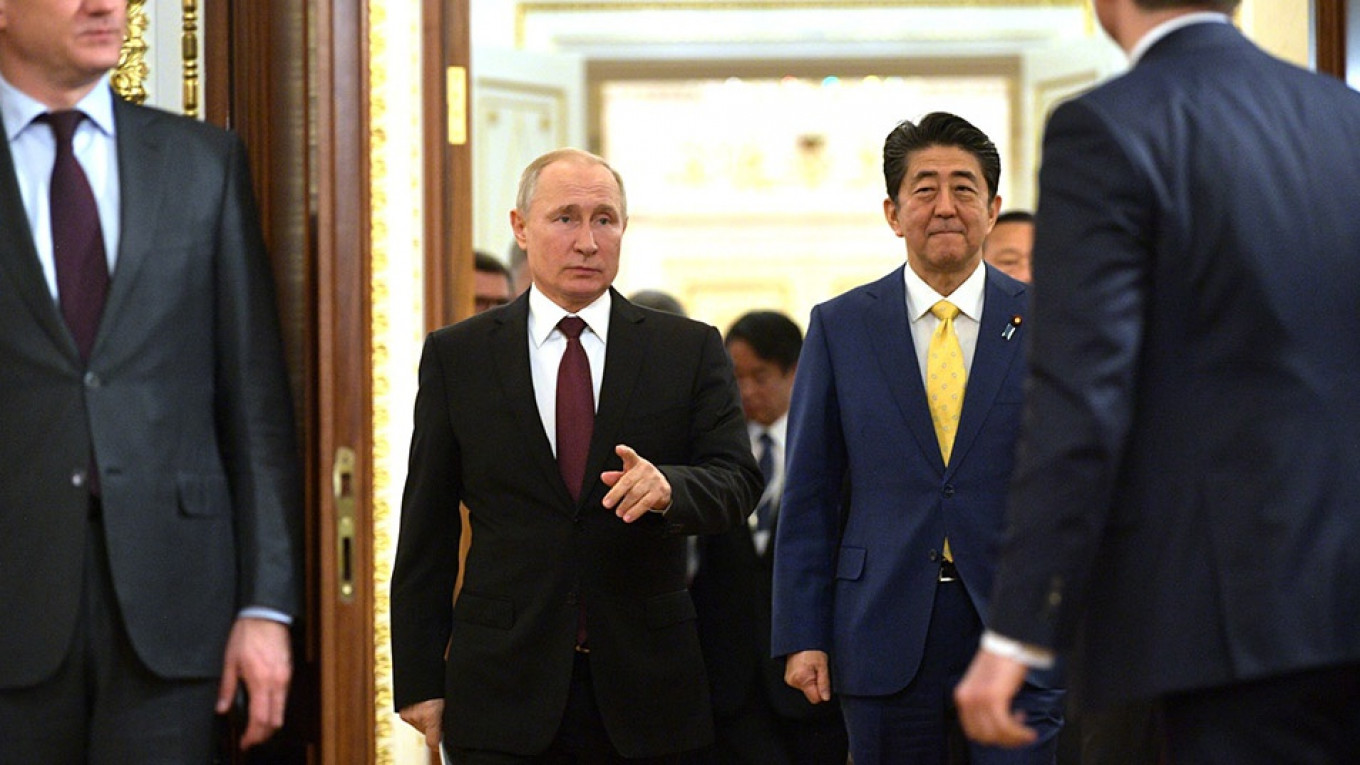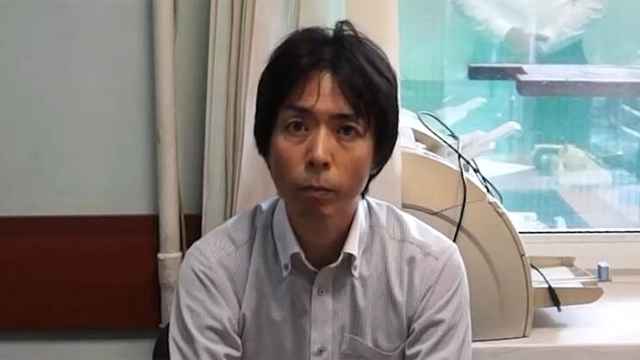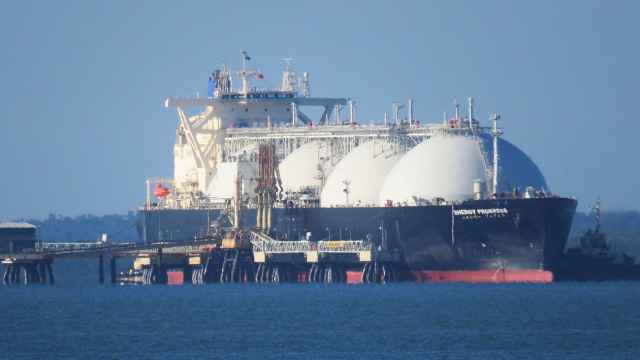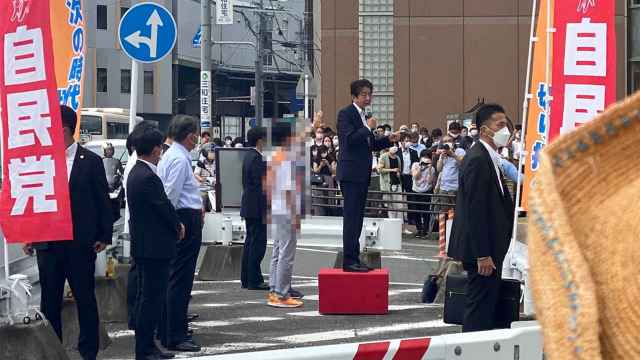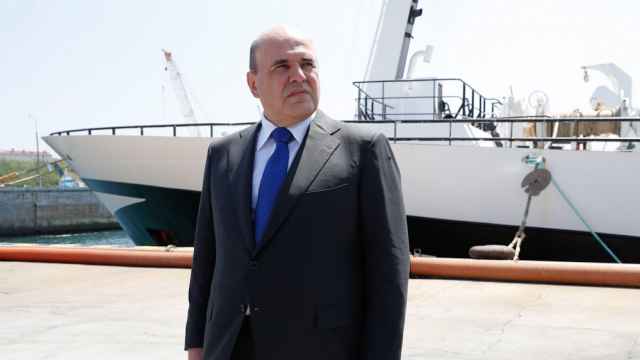The window of opportunity for Russia and Japan to officially end World War II with a peace treaty narrowed again after Prime Minister Shinzo Abe’s visit to Moscow on Tuesday failed to end in a breakthrough. There’s still time for Abe to secure his legacy, but a lot depends on President Vladimir Putin’s increasingly shaky domestic standing.
As I wrote when Putin and Abe met in November (the meeting Tuesday was their 25th), both leaders need a deal more than ever. For Abe, an end to the dispute with Russia over islands the Soviet Union seized from Japan at the end of World War II would be the big win he needs to serve out his term and become Japan’s longest-serving prime minister, while potentially driving a wedge between Russia and China, which together present the biggest threat to Japan’s security.
For Putin, an agreement with Japan would be both strategically and tactically beneficial. The development of Russia’s vast Far East is one of the president’s strategic priorities, and he hopes to get Japan’s help to counterbalance China’s growing role in the region. Putin appears to be out of productive foreign policy ideas, and forging a closer relationship with Japan would offer some exciting opportunities. Negotiating a peace treaty that would include non-aggression guarantees would undermine U.S.-Japanese military cooperation, and could undercut U.S. attempts to isolate Russia economically.
These motivations are still there, but the moment to cut through the Gordian knot appears to have passed, at least temporarily. Putin is, somewhat unexpectedly, living through one of the worst moments of his presidential career. Russia’s economic growth has stalled and there are no obvious ways to restart. Last year, capital outflow from Russia reached $67.5 billion, the central bank reported last week. That’s almost three times as much as in 2017 and the most since 2014, the year of the Crimea annexation and a catastrophic drop in oil prices.
Putin has scored few foreign policy achievements lately, and the messages on Ukraine and the Middle East churned over and over by the powerful domestic propaganda machine attract less interest than before. Both main state-owned TV channels lost viewership share in 2018. Instead, Russians rely more on internet, and often on the gloomy rumors spread on the social networks. A recent, particularly persistent one maintains that what the authorities described as a gas explosion in the steel-mill city of Magnitogorsk, in which 39 people died, was actually a terrorist attack followed by a cover-up.
Accordingly, Putin’s popularity keeps going down. The Kremlin team hoped it would bottom out around the 2013 level after taking an understandable hit from a hike in the retirement age -- but that hasn’t happened. A January poll by VCIOM, a polling agency loyal to the Kremlin, showed that only 33.4 percent of Russians have confidence in Putin. That’s the lowest level since 2006; as Putin was re-enthroned in a tightly controlled “election” in March, VCIOM reported a confidence level above 57 percent.
The last thing Putin needs now is the instability that would be fostered by a deal with Japan that requires Russia to surrender territory. Putin and Abe have discussed going back to the terms of a joint declaration the Soviet Union and Japan signed in 1956, in which the Soviets agreed to hand over to Japan the islands of Shikotan and the Habomai islets. Japan wants two more, much bigger islands, Etorofu and Kunashiri, but Abe has signaled his willingness to sign off on the 1956 terms, and he has domestic support for that. In Russia, however, the handover of any land is highly unpopular: according to a November poll by Levada Center, the country’s last remaining big independent pollster, 74 percent of Russians are against letting Japan have any of the islands.
Putin could still do the deal, but he’d need a more popular event to offset it. The Kremlin has been pushing for a closer union with Belarus that would essentially create a single state of the two countries, with a single currency, a shared justice system and other attributes of statehood. But Belarussian President Alexander Lukashenko has stubbornly resisted these plans (which are unpopular in his country) and signaled he’d weaken the alliance with Russia and seek help in the West if pressure continued to mount.
This is simply not the moment for Putin to cede anything to Abe. So earlier this month, Russian Foreign Minister Sergei Lavrov said after meeting with his Japanese counterpart that Japan would need to recognize Russian sovereignty over the disputed islands as a precondition of peace. This is unacceptable to Abe, but Russia has never promised to hand over the islands, preferring to discuss all sorts of compromise arrangements such as the joint development of the disputed territories.
The lack of quick progress in the Russian-Japanese talks doesn’t necessarily mean a return to the dead end that all previous talks have hit. Both sides still need a deal. They’ll keep working on it and waiting for a more opportune moment. Putin’s fading domestic political magic, however, makes it doubtful that he can create it in time for Abe to claim the win he craves.
Leonid Bershidsky is a Bloomberg View columnist, the founding editor of the Russian business daily Vedomosti and the founder of the opinion website Slon.ru. The views and opinions expressed in opinion pieces do not necessarily reflect the position of The Moscow Times.
A Message from The Moscow Times:
Dear readers,
We are facing unprecedented challenges. Russia's Prosecutor General's Office has designated The Moscow Times as an "undesirable" organization, criminalizing our work and putting our staff at risk of prosecution. This follows our earlier unjust labeling as a "foreign agent."
These actions are direct attempts to silence independent journalism in Russia. The authorities claim our work "discredits the decisions of the Russian leadership." We see things differently: we strive to provide accurate, unbiased reporting on Russia.
We, the journalists of The Moscow Times, refuse to be silenced. But to continue our work, we need your help.
Your support, no matter how small, makes a world of difference. If you can, please support us monthly starting from just $2. It's quick to set up, and every contribution makes a significant impact.
By supporting The Moscow Times, you're defending open, independent journalism in the face of repression. Thank you for standing with us.
Remind me later.



